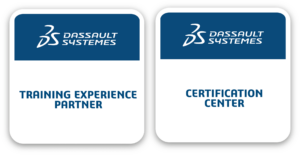To succeed in its digital transformation and meet today’s technological and environmental challenges, industry needs to reinvent itself today. Boosting innovation also means mobilizing employees to tackle change management more calmly and effectively.
Interview with Sabrina LEGUE, Training and Customer Support Manager at KEONYS, on the strategic advantage of training in PLM technologies from Dassault Systèmes.
Some manufacturers are still reluctant to go all-digital. How can we help them?
S.L. Training is the keystone of product innovation. Digital transformation is no longer an option, but a necessity. New tools, new processes and methodologies, the end-to-end digital continuity of product lifecycle management is an indeniable guarantee of efficiency and productivity in an increasingly competitive environment. Real-time data processing makes it possible, for example, to better monitor production quality requirements and anticipate breakdowns, a major challenge for the supply chain. But it’s not enough to adopt new tools; it’s crucial that every employee, from operator to production manager, is able to understand, master and exploit them.
As a long-standing Dassault Systèmes training partner and certification center, we have developed a wide range of standard and/or customized training courses on all Dassault Systèmes 3DEXPERIENCE, CATIA, DELMIA, ENOVIA, SIMULIA and SOLIDWORKS solutions. We provide face-to-face and online support for the entire value chain of industry jobs from introduction to the tools to advanced levels.

What new trends are you observing?
S.L. In the twenty-plus years I’ve been working in this role in the vast world of PLM, I’ve seen many changes in professional training and regulations, such as the 2018 “professional future” law or the digitalization of training, enabling greater flexibility and accessibility.
It’s no longer enough to offer standard training courses, but to precisely analyze and understand specific training needs and objectives. We then develop customized curricula and implement performance indicators to measure the impact and satisfaction of our customers. Supporting the digitization of industrial processes requires multi-disciplinary skills from our experts, who are themselves committed to keeping abreast of the latest technological developments.
For example, a major player in the Aerospace & Defense sector entrusted us with a training program for their employees as part of their digital transformation project. A detailed analysis of their needs enabled us to set up a customized curriculum, starting with the fundamentals of the 3DEXPERIENCE collaborative platform, right through to business-specific training on the platform.
At the same time, we organized a monthly review with our customer to assess the performance indicators (KPIs) of the various training modules. This was a key step in readjusting some programs and adapting to the requirements of the customer’s implementation schedule.
Support in adopting the 3DEXPERIENCE platform generated productivity gains for this customer, significantly reducing time-to-market.
What’s your customer’s profile?
S.L From mechanical engineers to industrial product managers, from designers to innovation and R&D project managers… from start-ups, SMEs and major groups, we support those who innovate and seek more sustainable solutions in a wide range of sectors. We also cover the academic field (high schools, colleges and engineering schools) to prepare tomorrow’s talent for a constantly evolving job market, as well as many internationally renowned research institutes.
If you had to choose three major benefits of change management?
S.L.: I’m convinced that change management is essential to the successful transition to new practices, processes or cultures within an organization. It’s important for management to communicate clearly and precisely upstream about the objectives and benefits of digital transformation, in order to get employees on board with the new work processes.
As part of our customers’ transformation plans, we set up Dassault Systèmes training courses to support their staff in optimizing industrial processes. Training can be provided during the project phase for key users, during solution deployment, or as part of ongoing employee skills development. The aim is to prepare teams for the changes to come and align them with new practices.
The main benefits I can note focus on three major topics:
- Optimized change management: Training prepares teams for organizational and technological change. Understanding the objectives and benefits of change makes it easier for them to move out of their comfort zone.
- Adapting skills: any change implies a shift in tasks, areas of expertise and even responsibilities. Training provides the know-how and interpersonal skills needed to effectively implement the ambitions of a transformation plan.
- Reducing fears: When faced with a transformation, employees can feel apprehensive. Training provides the keys to understanding and the resources needed not only to succeed in these changes, but also to concentrate on higher value-added tasks.
What was your latest challenge?
Developing new skills is no longer the only challenge; keeping them up to date is a key factor in maintaining competitiveness of companies. The adaptability and personalization of training programs are essential to ensure business continuity of the company and to invent the future today.
We have succeeded in guaranteeing to our various training centers that they retain our Qualiopi certification for our training activities.
Qualiopi is a guarantee for our customers of the quality of the training process. This certification also enables our customers to have their training courses financed by public and mutualized funds (OPCO, France Travail, the regions or other public schemes).
I’d like to point out that the work carried out by our teams to maintain Qualiopi certification has had many positive impacts on our own organization. It was an opportunity to rethink and implement a continuous improvement approach for all our processes. We gained in efficiency and strengthened our teams’ commitment to their missions. The analysis of feedback from our participants, funders and trainers for each session helped us to improve the content of our training courses.

To know more about KEONYS training





